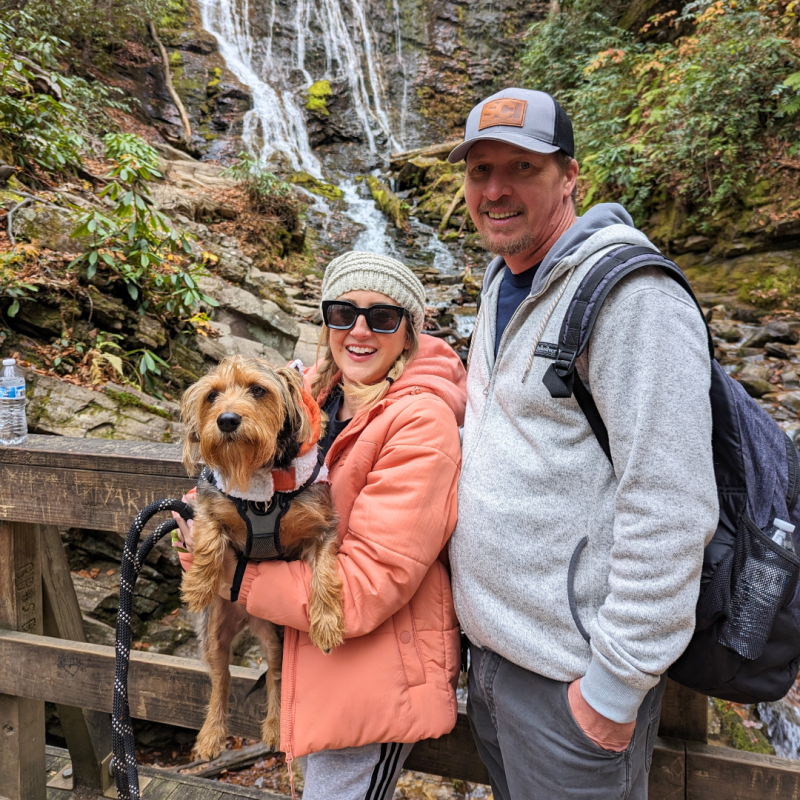
Heather Gensler spent two years being told that, “if it hurts, it’s not cancer.”
The 37-year-old from Charlotte, NC, found a lump in her breast when she was in her mid-20s. Gensler told doctor after doctor near her home about the lump. Over and over, she was told that it was a cyst or that, because of the pain, it wasn’t cancer and the lump would need to be dealt with cosmetically.
At 29, Gensler saw her gynecologist, Kathleen Persavich, MD, for a routine well-woman exam and told her that she planned to have cosmetic surgery to remove the lump.
“She told me that she didn’t like the feel of it, she didn’t like the size of it, she didn’t like anything about (the lump),” Gensler said. “If it weren’t for her, I don’t know where I’d be.”
Persavich ordered testing. When the results were in, Gensler returned to the office for a follow-up and took her mom with her.
“You don’t need your mom, but you kind of need your mom,” Gensler said. “She’s your mommy.”
Persavich gave Gensler the news – the lump was, in fact, cancer.
Gensler’s uncle had worked at Duke and told her that she needed to go to there to be seen. Gensler listened.
“It’s a dance”
The stage IV diagnosis didn’t come all at once.
“That’s what got me,” Gensler said, “I was diagnosed one by one.”
First, a spot was found on her shoulder, then her spine, her neck, and her hip.
In 2017, Gensler was told by oncologist Kimberly Blackwell, MD, that she wanted a scan of Gensler’s entire body to see the full scope of what was going on.
That scan found something in Gensler’s brain, which brought her to Peter Fecci, MD, PhD, and the Duke Center for Brain and Spine Metastasis (DCBSM).
“She’s been with us a long time,” Fecci said. “She really spotlights the number of therapeutic approaches and the gamut of options we have for patients and the approach and effectiveness of therapies.”
Fecci said that over the years, Gensler has received a total of four brain surgeries including LITT (laser interstitial thermal therapy) and brain resections. She has also undergone chemotherapy and six radiation treatments to varying sites.
“She continues to do very well,” he said. “She’s become a friend of the department in a way. We do everything we can for her and we enjoy seeing her.”
“I love them,” Gensler said of the team she’s now been seeing for nearly nine years. “I have the best team. They’re so great.”
In addition to Fecci, Gensler also sees Carey Anders, MD (medical oncology and breast oncology) and John Kirkpatrick, MD (radiation oncology). Fecci and Anders are the Center director and co-director. Kirkpatrick serves as the DCBSM director of radiation oncology.
The DCBSM encompasses neurosurgery, medical oncology, radiation oncology, and palliative care to ensure that patients have coordinated care across disciplines. Nurse coordinators are among the first people new patients interact with in DCBSM. They’re able to schedule patients with most, if not all, of their providers on the same day for streamlined access. They also pull the patient’s entire medical record ahead of time so that physicians are going in well-prepared to meet the patient.
“We discuss constantly our approach to multi-disciplinary care,” Fecci said, calling the treatments across departments “choreography.”
“It’s a dance of timing and what’s next up,” he said.
A most remarkable human
Gensler said that while treatment hasn’t been easy, “I trust Dr. Fecci and God that much. Whatever y’all want to throw at me, okay. I have faith and a good team.”
After her most recent brain surgery and subsequent radiation this year at Duke University Hospital, Gensler continues to receive her chemotherapy treatments in Charlotte.
Being able to receive chemo near home has made things even easier, Gensler said, noting that Anders works with her oncologist in Charlotte.
“Heather is one of the most remarkable humans I have had the honor to know,” Anders said. “She has faced a challenging diagnosis of metastatic breast cancer and brain metastases at a very young age. Despite her diagnosis requiring many treatment modalities, including surgery, radiation and systemic therapies, she faces each bravely and with a smile on her face. She has a remarkably positive attitude and remains 100% engaged in her care making thoughtful decisions along the way. She is true joy.”
Gensler, her husband Bobby, and their dog Ryder are “quite happy,” Gensler said. “I want to see people smile through it,” she said of being diagnosed with cancer. “Don’t let it win. Don’t let it change you. There’s life after being diagnosed.”
What she does hope to see change is age requirements around mammogram coverage by insurance. “Cancer doesn’t discriminate, so why does insurance?” Gensler said.
“Cancer will catch up with me one day,” Gensler said, “but I’ve had one hell of a ride. I’m still in the middle of it. I can’t wait to see what comes next. I’m not missing out on anything.”